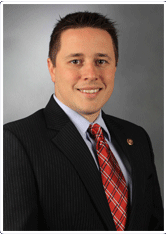 |
| Shown above, Sen. Ryan Silvey, R-Kansas City, accepting the Legislative Champion Award from Amanda Petelin of the American Cancer Society for his oral chemotherapy legislation that was signed into law and will help provide options and contain costs for individuals and families battling cancer. |
|
Last week, I filed legislation to begin reforming Missouri’s tax credit system, a long-standing goal of the Legislature. Senate Bill 507 would place an overall cap on the amount of tax credits the state authorizes each year, which is around $572 million. This amount is approximately what the school foundation formula is currently underfunded by, or would provide a substantial chunk of the costs to repair a crumbling Interstate 70. These reasons, and many other fiscal responsibilities, are why starting the process of reigning in annual expenditures on these programs is so important.
Many of these tax credits were born during a different economic time. The first issued was the Senior Citizen’s Property Tax Credit in 1973, but the real growth of these programs, as we now know them, occurred during the late 1990s and into the next decade.
State and national economies were thriving. Many states, Missouri included, found themselves with excess revenue. To further promote economic development, lawmakers began creating and approving incentives to spur growth in certain sectors of the economy and specific areas of the state. The programs, and their funding, increased exponentially; from roughly $102 million in Fiscal Year 1998 to more than half a billion dollars by FY 2010.
Then, with the recession in 2008, everything changed. If there was any silver lining to what was the most catastrophic economic event in almost a century, it’s that it reminded government of the necessity for fiscal responsibility. Lawmakers were forced to make tough decisions, and focus on the most critical state services that the public expects and needs. Yet throughout those budgetary cuts, tax credits remained completely untouched.
Despite broad agreement, the Legislature has been unable to reform what has become an unwieldy and expensive system. There is a legitimate argument for the ability of tax credits to encourage economic growth; they are a tool, and can effect solid change, if used responsibly. As stewards of taxpayer dollars, though, we have an obligation to make sure these incentives are making a solid return on investment, and aren’t simply corporate or special-interest handouts. We must also protect the financial future of our state.
Currently, Missouri carries over $2 billion in tax credit liabilities, due to the way the system is set up. First, an entity applies for the credit. If it is authorized, it can then be issued and redeemed. However, tax credits can be carried over multiple years. While the incentive may have been authorized and issued in a single year, it may be not be redeemed until years later.
By slowly limiting the amount of tax credits we authorize—3 percent each year; 15 percent once fully phased in—we can reduce the revenue we ultimately forgo for these programs. My legislation is a slight reduction in what we’re already authorizing each year so it’s not a massive overhaul of the way the system operates.
The bill also ties the cap to revenue collections from previous years, so that in the instance of an economic recession, we can clamp down these authorizations. When revenue collections are up, the cap stays up. The bill has the end-goal of finally limiting some of the excessive revenue we forgo in tax credits each year, especially when we’re faced with more urgent funding needs.
Senate Bill 507 would save the state around $80 million annually, once fully phased in. Those funds could be returned to citizens through tax relief, or reinvested in education, job training programs, much-need transportation repairs or any other number of positive efforts. Senate Bill 507 is modest step toward reform by approaching the problem from a new angle.
As always, I am here to serve the 17th District. I welcome any discussion, questions or concerns regarding Missouri government. Please feel free to contact me at the State Capitol: (573) 751-5282, ryan.silvey@senate.mo.gov, or by writing to Sen. Ryan Silvey, Missouri State Capitol, 201 W. Capitol Ave., Room 331A, Jefferson City, MO 65101. |



